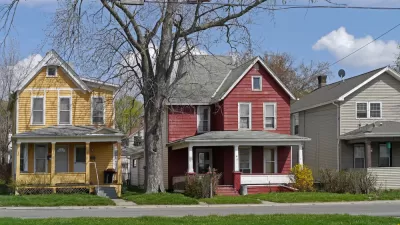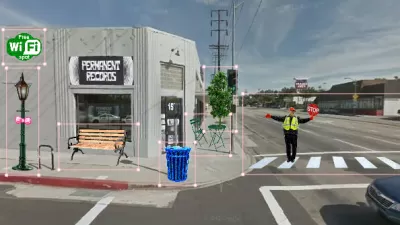United States
How States Can Combat Affordable Housing NIMBYs
The U.S. is in the midst of an affordable housing crisis. But as the landmark Mount Laurel saga illustrates, many communities object to developing such housing. Corianne Payton Scally argues that states should work harder to promote such projects.
Virginia Gas Tax Could be Model for Federal Transportation Tax
Could Virginia, the state that did away with its gasoline excise tax entirely, be the template for a new federal transportation funding system? By using multiple taxes and fees, they present an alternative to simply raising the federal gas tax.
Is Traffic Congestion Good or Bad?
No one likes to be stuck in traffic. But while empty streets may look great from behind the wheel of a car, they could signal a city in distress. A new study identifies the tipping point at which congestion becomes a drag on a city's economy.
NYC Releases New Street Design Manual
New York City's Department of Transportation has officially released the second update to its Street Design Manual, providing specifics on new and forthcoming alterations to the city's streets and street furniture.
Wanted: Six Cities Yearning to be Bike Friendlier!
For cities that want protected bike lanes but lack the expertise to implement them, the Green Lane Project is soliciting applications to offer technical help (sorry, no funding) now that the initial six recipient cities have implemented cycle tracks.

The Decline and Disappearance of the Middle Class Neighborhood
A new study observes the growing economic and income divide’s impact on America’s neighborhoods. Researchers have found the proportion of Americans living in 'middle class' neighborhoods declining, while 'rich' and 'poor' neighborhoods are growing.
What's the Best Way to Increase Affordable Housing?
Amid America's urban renaissance, increasing the supply of affordable housing has arisen as a topic of concern in several of the country's cities. The New York Times "Room for Debate" page asks eight experts to contribute their recommendations.
Americans Pay More for Walkability
Preliminary results from a new study suggest that Americans are willing to pay about $850 more per Walk Score point when purchasing a home.
America's Biking Boom Moves to the 'Burbs
Suburban locales have typically lagged behind larger cities in building bike-friendly infrastructure. But the League of American Bicyclists' latest round of Bicycle Friendly Communities designations indicate a sea change is happening in the suburbs.

Trick Out Your Street With Two New Design Tools
People-powered street design is getting a major boost with the help of two new tools that make it easy to reimagine unsatisfactory streetscapes.
The Inputs Change, But Our Desire to Rank Places Never Wanes
Add a list of the "Top 100 Best Places to Live" to the seemingly endless series of rankings seeking to quantify what's best and worst about our cities and states. Though the inputs have changed over the last 80 years, our desire to rank hasn't.
Accidents Not the Leading Cause of Vehicle-Related Deaths
A new study by MIT researchers indicates that a greater number of premature deaths in the United States can be attributed to auto pollution than auto collisions.
Is Biking With Your Child an Unnecessary Risk?
Tanya Snyder, Streetsblog's Capitol Hill editor and mother of 21-month-old daughter Luna, writes about a conversation she had with Dr. Phyllis Agran, consultant to American Academy of Pediatrics, about the risks she has exposed Luna to when biking.
Effort to Rein in Federal Flood Insurance Program Causing Alarm
As a 2012 law aimed reforming the "increasingly unsustainable" National Flood Insurance Program goes into effect, some homeowners in coastal areas are seeing dramatic increases in their insurance rates. Lawmakers are pondering how to ease the pain.
Supreme Court to Consider EPA's Ability to Regulate Emissions Beyond Cars and Trucks
Though the U.S. Supreme Court turned aside a more aggressive challenge to the EPA's climate regulating authority, it has agreed to hear arguments on the agency's ability to limit emissions from stationary sources.

Why Suburban Sprawl is the Worst Idea America Has Ever Had
In a recent "TED Talk", Jeff Speck makes the case for creating a more walkable America based not on design arguments, but rather on the potential to create a more economically resilient, healthier, and environmentally sustainable country.
Sipping from the Tea Party Cup: A Call for an Urbanist Revolt
Musing on the discussion at last week's Citylab conference, Jarrett Walker finds a surprising convergence with the ideology of America's Tea Party: "Big and active national government may not be the answer." Would cities be better off going it alone?
Despite Sandy Disruption, Amtrak Has Another Historic Year
For the tenth time in eleven years, Amtrak hit another historic high in ridership in FY 2013. While overall ridership was up one percent, revenues were up more than 4 percent.
Answers on the Nation's First VMT Fee Law
With Oregon set to implement their vehicle-miles-traveled (VMT) fee program, Streetsblog's Tanya Snyder provides answers to ten questions, including the privacy challenge, that she posed to ODOT’s Jim Whitty, architect of the program.
Making the Camera Your Friend
The role of photography in urban planning should not be underestimated. Visual communication is incredibly important and powerful. Michael Heater provides a guide to using photos to remember, inspire, and create.
Pagination
Urban Design for Planners 1: Software Tools
This six-course series explores essential urban design concepts using open source software and equips planners with the tools they need to participate fully in the urban design process.
Planning for Universal Design
Learn the tools for implementing Universal Design in planning regulations.
planning NEXT
Appalachian Highlands Housing Partners
Mpact (founded as Rail~Volution)
City of Camden Redevelopment Agency
City of Astoria
City of Portland
City of Laramie


































